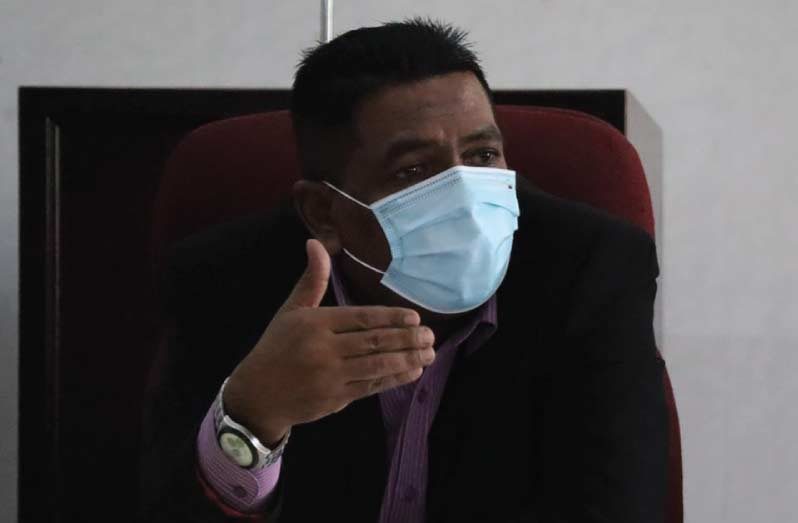By Naomi Parris
-Minister Mustapha calls for collaboration within sector
“THE agriculture sector has what it takes to drive the economy post-COVID-19,” said Minister of Agriculture Zulfikar Mustapha on Wednesday as he addressed several issues plaguing the sector during the coronavirus pandemic.
The minister was at the time participating in an agriculture webinar, hosted by the Guyana Manufacturing & Services Association (GMSA) and the Inter-American Development (IDB) Bank, where he engaged several local and international stakeholders in the sector.
The webinar, he noted, was timely as it paved a path forward for the sector to co-exist with COVID-19 for a foreseeable future and to cash in on the opportunities to expand agriculture in Guyana.
“The agriculture sector, both the public and private sectors, are struggling to deal with the impact of the pandemic. Whilst there is no major problem of availability of food, access to food through supply-chain interruptions and loss of income are [SIC] being experienced,” he said.
During this difficult time, he added that the sector is not without its challenges. The country currently produces 59 per cent of the food for consumption, which means Guyana’s food import dependence is 41 per cent, he said, adding that this should not be. In this regard, Minister Mustapha said the government along with other agriculture stakeholders will need to collaborate to reduce this import dependence by creating and enabling an environment for an efficient and competitive local manufacturing sector.
“We must focus on ways to expand, shift agriculture from primary producer to value-added, to reduce the 41 per cent dependence on imports, which include processed products, dairy products, grains such as corn and soybean, etc.,” he said.
The minister further explained that such an expansion will aid in the reduction of the country’s domestic food-import bill of GUY$45Billion, and will make room for Guyana to tap into the estimated US$8-10B (2020) CARICOM food-import bill
Energy and Agriculture
Further, Minister Mustapha noted that for far too long, the constraint of high energy cost has caused the sector to remain stunted and not expand at the rate one would like. In this regard, he said, “The government is committed to the generation of cheap energy… the government would pursue hydro-electricity, among other energy-generation initiatives.”
He added that the president himself had committed to this, stating that the People’s Progressive Party/Civic (PPP/C) government would provide “cheaper and more reliable electricity,” reducing the cost of energy by 50 per cent through a mix of hydro, gas, solar, and wind power.
Access to Raw Materials
Reiterating that it will take a collaborative effort to build the agriculture sector, the minister noted that agricultural agencies such as The New Guyana Marketing Corporation (NGMC) and the National Agricultural Research and Extension Institute (NAREI) will work with farmers to form formal market arrangements, such as clusters, to address the raw-material challenges for agro-processors and inputs for agro-producers. This will assist with issues of reliability, quantity, and quality of supply.
With Budget 2020, he disclosed that the Ministry of Agriculture has started a “Rural Infrastructure Development Plan,” targeting both drainage and irrigation and farm-to-market access roads to reduce the cost of production for farmers.
He further noted that Budget 2020 also gives “Tax concessions on Investment in Agro-processing facilities, cold storage and packaging” to provide opportunities for our agro-processors to grow, process, and trade more to increase their incomes.
“This is a start. We will continue to build on as the years progress… The reversal of VAT on electricity, water, machinery and equipment, exports, fertilisers, agro-chemicals, among others, will improve the viability of small-business start-ups and the sustainability of existing businesses by reducing the cost of production and increasing competitiveness,” he said.
Financing
Addressing access to financing, the minister noted that the government is committed to “supporting private-sector development” by pursuing and maintaining an environment for businesses (including agro-processing) to establish and to grow.
To this end, small businesses will be supported with $100 million for the Small Business Development Fund, to be used to provide loans and grants to prospective small-business owners.
“My ministry will work with the Ministry of Tourism, Industry, and Commerce and with agri-businesses to ensure they can tap into this fund. Whether it be assistance in the proposal or capacity-building on how to get ‘value for dollar’ when operating a business,” he said.
Additionally, the NGMC has been allocated $236 million to support institutional marketing arrangements; strengthen the value chain; work with farmers to comply with quality standards and food-safety systems and expand new high-value/processed markets for Guyana’s products.
Technology and Technical Knowledge
The minister noted that for Guyana to fully take advantage of the opportunities for high-value, agro-processed products, there is a need for more research and development and it must be commercially viable.
“We will work with producer groups and progressive farmers and agro-processors to establish processing facilities for the processing of agriculture produce such as dried fruits, fruit juices, peanut butter, etc. We will work to secure low-cost technologies for primary processing in rural areas,” he said.




.png)









